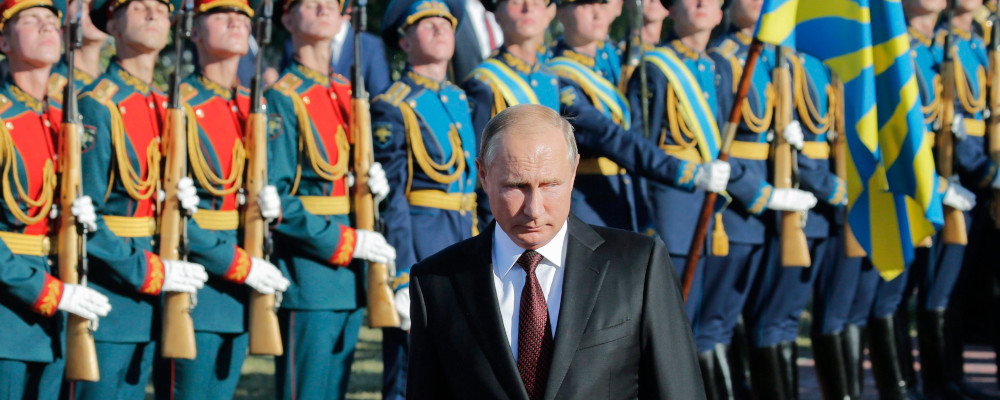In the latest Hub book review, Patrick Luciani reviews How States Think: The Rationality of Foreign Policy by John Mearsheimer & Sebastian Rosato (Yale University Press, 2023) and highlights how his influential book and his activism helped lay the framework, intellectual and otherwise, for the unrest of our current moment.
When Russia invaded Ukraine on February 24, 2022, the act looked irrational, even mad. Not to neorealists. The invasion was not only rational but also predictable. So argue political scientists John Mearsheimer and Sebastian Rosato in a new book, How States Think.
The authors believe the best way to look at international conflict is through the lens of power politics. For Russia, losing Ukraine to the West would have tipped the scales of power in NATO’s favour, and that was reason enough to go to war. Professor Mearsheimer has insisted from the beginning that America was to blame for the Ukraine war because they knew how the game was played and pushed it too far. Even if Russia loses the war, it was the right decision from the book’s perspective.
According to the authors, two conditions must hold for an act of war to be rational. First, there must be an open and free consultation with all significant policymakers at the highest level to vet all options before deciding. Second, leaders must adhere to a credible theory of how the world works.
As realists or neorealists, Mearsheimer and Rosato believe that power is the only conflict arbiter since there are no powers above that of the state. Classical thinkers Thomas Hobbes and Niccolò Machiavelli knew that security was the highest end for people, or princes, who must take the world as it is, not how it should be.
Liberals and soft power advocates argue that the ultimate aim of states is peace, not through power but through international cooperation. Mearsheimer and Rosato don’t think much of idealism or liberalism, especially now captured by the influence of political psychology and popular behavioural economics that focus on the individual and not the state. When that happens, the whole field of international security becomes fraught with chaos and little understanding.
How States Think takes the reader through several historical cases that once looked irrational but were, in hindsight, rational. Hitler’s attack on the Soviet Union in 1941 and the Japanese attack on Pearl Harbour in the same year were reasonable actions given the circumstances both countries faced. This, the authors argue, is because both Germany and Japan went through deliberative processes that came to conclusions that aligned with their theory of how the world works. Whether they achieved their goals isn’t the point. Rationality doesn’t need success to justify the action. Two other cases that met the test of rationality were the Cuban Missile Crisis of 1963 and the Soviet invasion of Czechoslovakia in 1968.
Examples of irrational wars were America’s attempt to oust Fidel Castro in 1961 and George W. Bush’s desire to bring democracy to Iraq in 2003. This false view of the world doomed both invasions. President John F. Kennedy falsely believed the domino effect that if Cuba went communist, so would South and Central America. In 2004, Bush was convinced he could bring peace to the Middle East by turning Iraq into a democracy and that other countries would follow in step. Both failed because they were based on false theories about the real world. Liberals and idealists want to put Putin on the psychiatrist’s couch and ask what quirk of personality drove him to invade. Neorealism just points to state survival as the ultimate answer.
There are problems with the book’s premise. The definition of rationality is too narrow to be considered substantial. Is a simple theory and broad policy consultation all we need to understand how wars begin?

One can easily argue that Putin wanted to maintain power and popularity as his primary motive in starting the war. Who’s to say otherwise? Putin also has a deep inferiority complex, knowing that Russia will never beat the West and will always be a mid-level power—albeit one with massive nuclear weapons—despite its grand history and contribution to literature and the arts. The Russian scholar Stephen Kotkin once said Russia’s “capabilities never matched its ambitions.” Who’s to say that isn’t a valid reason for behaviour? Or perhaps it comes down to the very nature of Russians, who see war as not the last resort but closer to the first choice, given their history of conflict?
It’s also naive to think Putin listened to his advisors with an open mind as a condition of rational behaviour. This misrepresents the facts we know about his behaviour and intolerance for open debate. Putin probably decided in early March of 2021 to attack Ukraine and brooked no opposition after. Some even argue that the botched U.S. pull-out of Afghanistan led him to believe President Joe Biden had no stomach for conflict. If he was so careful about the reasons for the war, why was he so unprepared to start it?
Ultimately, it is human beings, freighted with all their biases, emotions, motivations, and theories of how the world works, who evaluate and take action, not abstract concepts like “states”. Whether these people make peace, invade, or drop a nuclear weapon, the decision is up to them.




